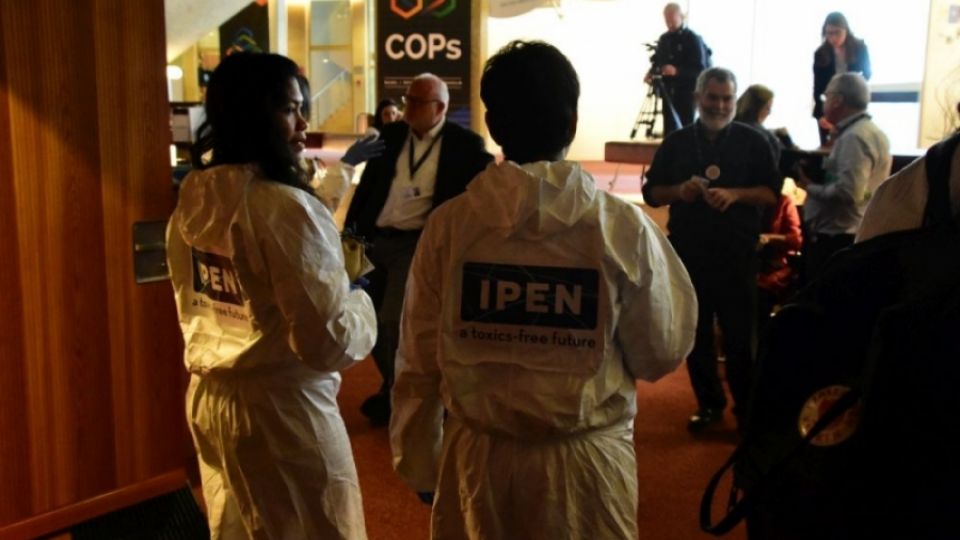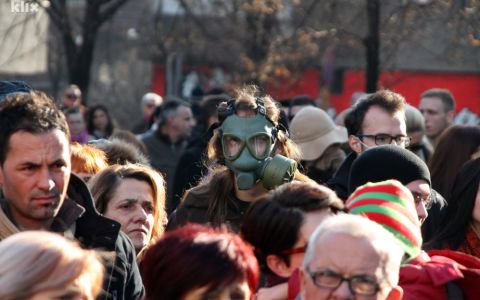The current negotiations of the world government representatives concerning ban of two hazardous toxic substances have been very bitter. As proved by the recently published studies of the international network IPEN (1), in which Arnika participated, based on analyses of the University of Chemistry and Technology (VŠCHT) in Prague, toxic flame retardants, including decaBDE (2), and chlorinated paraffins, SCCPs (3), are commonly present even in children's toys. On the 8th Conference of the Parties to the Stockholm Convention (4), government representatives adopted a decision incorporating these chemicals into the list of the banned substances, and, through that, recognized risks connected with their use, but, simultaneously, they granted unprecedented exemptions to their use. For example, there is a threat that decaBDE manufacturing will be allowed till 2050, and it will be used in European aircrafts till 2100. A group of delegates also blocked measures that would prevent recycling of materials containing flame retardants, and they rejected obligatory labelling of products containing these substances, too.
The current negotiations of the world government representatives concerning ban of two hazardous toxic substances have been very bitter. As proved by the recently published studies of the international network IPEN (1), in which Arnika participated, based on analyses of the University of Chemistry and Technology (VŠCHT) in Prague, toxic flame retardants, including decaBDE (2), and chlorinated paraffins, SCCPs (3), are commonly present even in children's toys. On the 8th Conference of the Parties to the Stockholm Convention (4), government representatives adopted a decision incorporating these chemicals into the list of the banned substances, and, through that, recognized risks connected with their use, but, simultaneously, they granted unprecedented exemptions to their use. For example, there is a threat that decaBDE manufacturing will be allowed till 2050, and it will be used in European aircrafts till 2100. A group of delegates also blocked measures that would prevent recycling of materials containing flame retardants, and they rejected obligatory labelling of products containing these substances, too.
„In fact, it is an attack on recycling, and we are surprised that the European Union, promoting the idea of circular economy, did not object to continuation of the toxic recycling, but, in fact, it agreed to that silently. A part of the representatives of the recycling companies are afraid of the future when they will not be aware of what they add into their products,“ commented RNDr. Jindřich Petrlík, Arnika's chairman participating in the negotiations, the development in Geneva.
„By their actions, delegates made a mockery of the theme of the meeting "A Future Detoxified,“ said Dr. Mariann Loyd-Smith from the international network IPEN. „The decision of the delegates guarantees that industry workers will continue to be unnecessarily exposed to harmful substances, children's toys will be poisonous, and toxic substances we should get rid of in our everyday life will continuously return to us by recycling of plastics. The real theme of the meeting seems to be "A Future Toxified,“ continued Dr. Loyd-Smith.
The government representatives approved a number of exemptions for the use of SCCPs, in spite of the fact that the Stockholm Convention Expert Committee did not recommend any of them. The list of the exemptions is so extensive that it is difficult to find what use of the substances will be actually banned.
DecaBDE is a flame retardant commonly found in electronic waste, and SCCPs are an industrial chemical used in metal working and as a flame retardant in plastics. They are ranked among the so-called persistent organic pollutants, are highly toxic and may cause a number of health problems. Moreover, they persist in the environment for a very long time, travel long distances, and their concentrations build up in the food chain. Recent IPEN studies found that the both substances were widely present in children's toys (5), and Arnika's studies based on the analyses of the University of Chemistry and Technology in Prague found decaBDE also in samples of eggs of free range chicken held in China and Kazakhstan (6).
Unfortunately, the Conference delegates did not promote the interests of the environment and consumer's health in a number of further issues, too. Thus, the developing and transition countries will not be able to easily comply with the Stockholm Convention requirements concerning waste, because a small group of countries rejected proposals to at least label new products containing the above-mentioned toxic substances. „Actually, the right of countries and consumers to information is the basic principle of chemical safety,“ said Mgr. Jitka Straková from Arnika, the co-author of one of the IPEN studies. „Consumers will not know that they will be buying these chemicals and exposing their children to them, because the governments did not dare to require that the industrial companies label products containing them.“
Further, the delegates agreed to allow continued recycling of materials containing toxic flame retardants (pentaBDE and octaBDE) found in furniture and electronic waste. If the chemicals are not removed, they are transferred into new products when the plastic is recycled. The practice violates the Stockholm Convention which explicitly prohibits recycling and reuse of substances on its list. Ironically, the decision admitted that toxic flame retardants had been detected in a range of consumer products, including plastic toys. The proposed recycling exemption is also tantamount to legalizing electronic waste dumping in developing countries, which is cynically described as „recycling“. „We already receive massive quantities of electronic waste and now it seems that the governments want to increase our toxic burden even more. This is exactly opposite to the Convention's goal," said Dr. Tadesse Amera from PAN Ethiopia.
On the contrary, a positive result is addition of hexachlorobutadiene (HCBD, 7) on the list of the unintentionally produced substances regulated by the Stockholm Convention. „The substance is produced as a waste of chlorinated solvent manufacturing in Spolchemie in Ústí nad Labem in high quantities. Recently, its monitoring in waste was ended by the Integrated Pollution Register in the Czech Republic. We hope that its addition on the Convention list will help to solve the problem of out-of-date technologies in the chemical industry,“ commented RNDr. Jindřich Petrlík the addition.
Notes:
1) IPEN is a network of organisations working in more than 100 countries, with the objective to reduce the amounts of toxic chemicals and to eliminate the harm to human health and the environment by these chemicals. For more information, please see www.ipen.org
2) Polybrominated diphenylethers (PBDEs) that include also decaBDE: http://arnika.org/pbde-polybromovane-difenylethery
3) Short-chain chlorinated paraffins (SCCPs): http://arnika.org/chloralkany-c10-13-sccp
4) The international Stockholm Convention was adopted in 2001 through the UNEP (United Nations Environment Programme). By its ratification, the signatory states accept the obligation to eliminate the most important persistent organic pollutants (POPs). The Convention was ratified both by the Czech Republic and the European Union. Arnika has been helping to meet the obligations according to the Convention both by regulating operation of waste management plants, and of other industrial activities in the Czech Republic and on the international level. The current Conference of the Parties was held in Geneva till May 5, 2017. http://chm.pops.int/
5) Details on the studies proving contamination of toys by toxic substances: http://arnika.org/latky-zpusobujici-u-deti-poruchy-chovani-a-nervove-soustavy-se-objevily-i-v-hrackach-na-ceskem-trhu
http://arnika.org/i-na-ceskem-trhu-jsou-ve-vyrobcich-pro-deti-latky-ktere-snad-uz-brzy-ceka-celosvetovy-zakaz
6) Study: http://english.arnika.org/e-shop/publications/pops-in-chicken-eggs-from-hotspots-in-china
http://english.arnika.org/e-shop/publications/chicken-eggs-as-the-indicator-of-the-pollution-of-environment-in-kazakhstan
7) Hexachlorobutadiene (HCBD): http://arnika.org/hexachlorbutadien-hcbd







